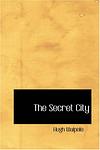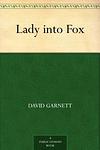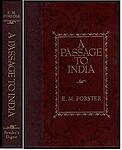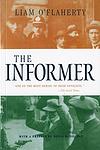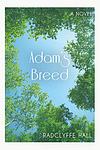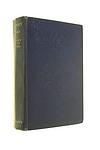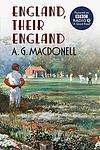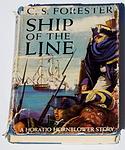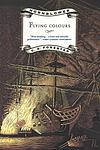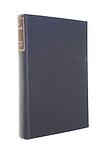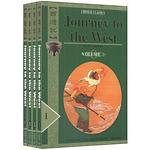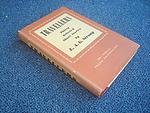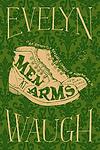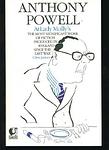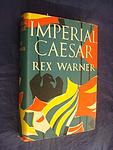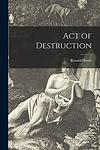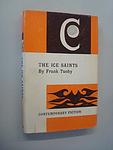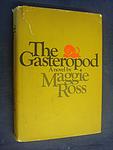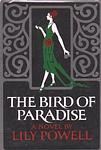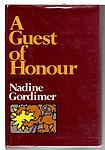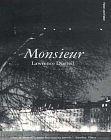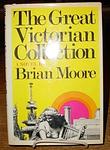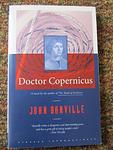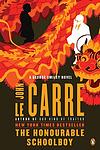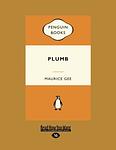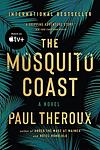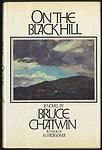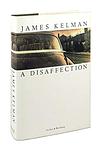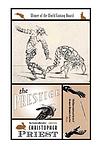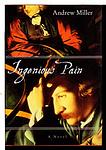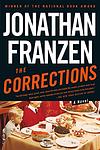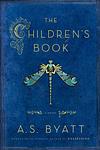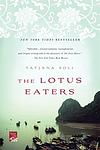James Tait Black Memorial Prize: Fiction
This is one of the 284 lists we use to generate our main The Greatest Books list.
-
The Secret City by Hugh Walpole
"The Secret City" is a gripping tale set in a small English town, where the lives of its inhabitants are forever changed by the arrival of a mysterious stranger. As secrets unravel and dark pasts resurface, the townspeople find themselves caught in a web of intrigue, betrayal, and forbidden love. With its atmospheric setting and complex characters, this novel explores the hidden depths of human nature and the consequences of keeping secrets.
-
The Lost Girl by D. H. Lawrence
"The Lost Girl" by D. H. Lawrence is a captivating novel that follows the journey of Alvina Houghton, a young woman who yearns for independence and self-discovery. Set in the early 20th century, Alvina's life takes a drastic turn when she meets a charismatic Italian musician, Ciccio, and embarks on a passionate but tumultuous relationship with him. As she navigates through societal expectations and cultural differences, Alvina must confront her own desires and find her true identity amidst a world that constantly tries to define her.
-
Memoirs Of A Midget by Walter de la Mare
"Memoirs Of A Midget" is a captivating and introspective novel that follows the life of a young woman who happens to be a midget. Through her unique perspective, the book explores themes of identity, love, and the search for meaning in a world that often treats her as an outsider. With beautiful prose and a deep understanding of human nature, the author delves into the complexities of society's perceptions and prejudices, ultimately delivering a thought-provoking and poignant tale.
-
Lady into Fox by David Garnett
A man's wife suddenly transforms into a fox, testing the boundaries of their love and marriage. The husband attempts to continue their relationship as normally as possible, treating his fox wife with the same affection and respect as before. However, as she becomes more fox-like in behavior and less human, their relationship becomes increasingly strained and complex. Ultimately, the story explores themes of love, transformation, and the human-animal divide.
-
Riceyman Steps by Arnold Bennett
"Riceyman Steps" is a captivating novel that delves into the life of Henry Earlforward, a middle-aged bookseller who becomes obsessed with money and order. Set in early 20th century London, the story follows Henry as he navigates his deteriorating health, complex relationships, and the challenges of running his bookshop. As the narrative unfolds, the reader is drawn into a world of intricate characters and moral dilemmas, exploring themes of greed, love, and the pursuit of happiness.
-
A Passage to India by E. M. Forster
The novel takes place in British-ruled India, where the cultural divide between the British and the Indians is explored. The story focuses on the experiences of an Indian Muslim, Dr. Aziz, and his interactions with an English woman, Miss Quested, and her elderly friend, Mrs. Moore. After an expedition to the Marabar Caves, Miss Quested accuses Dr. Aziz of assault, leading to a trial that deepens the racial tensions and prejudices between the colonizers and the colonized. The novel is a critique of British imperialism and a study of the cultural and racial misunderstandings and ill-will between the British and the Indian people.
-
The Informer by Liam O'Flaherty
"The Informer" is a gripping novel set in the tumultuous time of the Irish War of Independence. It follows the story of Gypo Nolan, a former member of the Irish Republican Army, who becomes an informant for the British police in exchange for a reward. As Gypo grapples with guilt and paranoia, he navigates a treacherous world of betrayal, loyalty, and political unrest, ultimately leading to a tragic and suspenseful climax. O'Flaherty's masterful storytelling delves into the complexities of morality and the devastating consequences of one man's fateful decision.
-
Adam's Breed by Radclyffe Hall
"Adam's Breed" by Radclyffe Hall is a captivating novel that follows the life of Adam, a talented Italian chef who leaves his small village to pursue his dreams in London. As he navigates the bustling city and the challenges of his profession, Adam's passion for food and his unwavering determination to succeed drive him forward. Along the way, he encounters love, heartbreak, and the complexities of human nature, ultimately finding solace in his culinary creations and a sense of fulfillment in his chosen path.
-
Portrait Of Clare by Francis Brett Young
"Portrait of Clare" is a captivating novel that explores the complex and intertwined lives of a group of individuals in a small English village. The story revolves around Clare, a beautiful and enigmatic woman, whose presence has a profound impact on those around her. Through vivid descriptions and poignant character development, the author delves into themes of love, desire, and the struggle to find one's true identity. Set against the backdrop of World War II, this evocative tale delves into the depths of human emotions and the enduring power of art.
-
Memoirs of a Fox-Hunting Man by Siegfried Sassoon
This semi-autobiographical novel follows the life of a young man growing up in the English countryside in the early 20th century. He's enamored with the sport of fox hunting, and through his experiences and interactions with the rural community and the natural world, he develops a deep appreciation for the beauty and tranquility of life. However, the advent of World War I shatters his peaceful existence, forcing him to confront the harsh realities of life and the brutality of war.
-
The Good Companions by J. B. Priestley
"The Good Companions" is a heartwarming tale that follows a diverse group of individuals who come together to form a traveling concert party. As they embark on a journey across England, they encounter various challenges and adventures that test their friendships and resilience. Through their shared experiences, the characters discover the transformative power of companionship and the importance of finding joy and purpose in life. With its lively and engaging narrative, this novel celebrates the beauty of human connection and the pursuit of happiness.
-
Miss Mole by E. H. Young
The book "Miss Mole" by E. H. Young is a captivating story set in the early 20th century, following the life of a middle-aged spinster named Miss Mole. After being dismissed from her job as a governess, Miss Mole finds herself in a new position as a housekeeper for the eccentric and dysfunctional family, the Blakes. With her sharp wit, intelligence, and unconventional ways, Miss Mole navigates the challenges of her new role while also concealing a secret from her past. As she forms unexpected connections and faces various trials, Miss Mole learns about love, friendship, and the power of staying true to oneself.
-
Without My Cloak by Kate O'Brien
"Without My Cloak" is a captivating novel set in 19th century Ireland, exploring the lives of a wealthy Anglo-Irish family and their struggles with love, loyalty, and societal expectations. The story follows the complex relationships between family members, revealing their secrets, desires, and the consequences of their actions. Through vivid descriptions and compelling characters, the book delves into themes of identity, class divisions, and the clash between tradition and modernity in a changing society.
-
Boomerang by Helen Simpson
"Boomerang" by Helen Simpson is a collection of short stories that explores the complexities and contradictions of modern life, particularly focusing on the experiences of women. With wit and insight, the book delves into themes of love, marriage, motherhood, and aging, offering a nuanced portrayal of the challenges and joys that come with each stage of life. Through her well-crafted characters and sharp observations, Simpson offers a thought-provoking examination of contemporary society and the ever-changing roles and expectations placed upon women.
-
England, Their England by A. G. Macdonell
"England, Their England" is a satirical novel that follows the misadventures of Donald Cameron, a Scottish writer who moves to England to pursue his literary career. Through humorous anecdotes and witty observations, the book explores the cultural differences and eccentricities of the English society in the early 20th century. As Donald encounters various peculiar characters and navigates the complexities of English customs, the novel offers a humorous and insightful commentary on national identity, class divisions, and the idiosyncrasies of English life.
-
I, Claudius by Robert Graves
This historical novel is a first-person narrative told from the perspective of the Roman Emperor Claudius, who was considered an unlikely ruler due to his physical ailments and perceived lack of intelligence. The story covers the reigns of Augustus, Tiberius, and Caligula before Claudius unexpectedly becomes emperor. The narrative provides a critical look at the corruption, violence, and political machinations of the Roman Empire, offering a unique perspective on history.
-
Claudius The God by Robert Graves
"Claudius The God" is a historical novel that follows the life of Emperor Claudius, who unexpectedly rises to power in ancient Rome. Written as an autobiography, the book provides a unique perspective on the inner workings of the Roman Empire and the challenges faced by Claudius as he navigates political intrigue, assassination attempts, and the complexities of ruling a vast empire. With a blend of fact and fiction, the novel offers a vivid portrayal of Claudius' reign and the tumultuous era in which he lived.
-
The Root And The Flower by L. H. Myers
"The Root And The Flower" is a captivating novel that explores the life of a young Englishman named Richard Anger who travels to India in search of his identity. Set against the backdrop of the British Raj, the story delves into themes of cultural identity, love, and the clash between Eastern and Western values. As Richard navigates the complexities of Indian society, he becomes entangled in a web of relationships and encounters a diverse cast of characters that challenge his beliefs and force him to confront his own prejudices. This thought-provoking and beautifully written novel offers a profound exploration of self-discovery and the transformative power of love.
-
South Riding by Winifred Holtby
"South Riding" is a compelling novel set in the fictional Yorkshire town of South Riding during the 1930s. The story revolves around Sarah Burton, a headstrong and determined young woman who becomes the first female headmistress of the local school. As she navigates the complexities of education, politics, and personal relationships, Sarah finds herself at odds with the conservative forces of the community. With vivid descriptions and a keen eye for social issues, the novel explores themes of ambition, love, and the pursuit of progress in a changing society.
-
Highland River by Neil M. Gunn
"Highland River" is a poignant and lyrical novel set in the rugged Scottish Highlands. It follows the life of a young boy named Kenn, who grows up in a remote village surrounded by breathtaking landscapes and a close-knit community. As he navigates the challenges of adolescence and discovers his own identity, Kenn finds solace in the mystical power of the river that flows through his village, symbolizing the timeless and transformative nature of life itself. Through vivid descriptions and rich character development, the author explores themes of love, loss, and the unbreakable bond between humans and their natural surroundings.
-
A Ship Of The Line by C S Forester
In "A Ship Of The Line" by C.S. Forester, the story follows the adventures of Captain Horatio Hornblower as he commands the HMS Sutherland, a powerful ship of the line, during the Napoleonic Wars. As Hornblower faces various challenges, including battles at sea, political intrigue, and personal dilemmas, he must rely on his intelligence, resourcefulness, and leadership skills to navigate through the dangerous waters of war and emerge victorious. With vivid descriptions and compelling characters, the novel offers a thrilling and immersive glimpse into the world of naval warfare in the early 19th century.
-
Flying Colours by C S Forester
In this historical fiction novel set during the Napoleonic Wars, a British naval officer named Horatio Hornblower is given the task of escorting a convoy of merchant ships through dangerous waters infested with enemy ships. As he faces numerous challenges and battles, Hornblower demonstrates his exceptional leadership skills and strategic thinking, earning the respect and admiration of his crew. With thrilling naval battles and a compelling protagonist, "Flying Colours" is an exciting tale of adventure and heroism on the high seas.
-
After Many A Summer Dies The Swan by Aldous Huxley
"After Many A Summer Dies The Swan" is a thought-provoking novel that follows the life of an eccentric millionaire, Jo Stoyte, who becomes obsessed with the possibility of immortality. In his quest for eternal life, Stoyte surrounds himself with a group of intellectuals and scientists, and together they embark on a journey filled with philosophical discussions, scientific experiments, and dark secrets. As the story unfolds, the characters grapple with the moral implications of their actions and confront the inevitable nature of death, ultimately leading to a profound exploration of the meaning of life and the human condition.
-
The Voyage by Charles Morgan
"The Voyage" by Charles Morgan is a gripping tale that follows the journey of a group of individuals aboard a ship, each with their own secrets and motives. As they navigate treacherous waters and encounter unforeseen challenges, tensions rise and alliances are tested. With vivid descriptions and intricate character development, the book explores themes of love, betrayal, and the human capacity for resilience in the face of adversity.
-
A House Of Children by Joyce Cary
"A House of Children" is a compelling novel that delves into the lives of the Clare family, who live in a grand house in the English countryside. Set during the interwar period, the story follows the three children as they navigate their privileged yet tumultuous upbringing. With a keen eye for social dynamics and the complexities of family relationships, the author explores themes of class, power, and the impact of societal expectations on individual lives. As the children grow older, they confront their own desires and ambitions, ultimately questioning the values and traditions that have shaped their lives.
-
Journey to the West by Wu Cheng'en
"Journey to the West" is a classic Chinese novel that follows the adventures of a Buddhist monk and his three disciples, a monkey, a pig, and a river monster, as they travel from China to India in search of sacred Buddhist scriptures. Along the way, they face a series of challenges and obstacles, including battling demons and overcoming their own personal weaknesses. This epic tale is a blend of mythology, folklore, and fantasy, and is also a commentary on the practice and principles of Buddhism.
-
Tales From Bective Bridge by Mary Lavin
"Tales From Bective Bridge" is a collection of short stories that explores the lives of ordinary people in rural Ireland. Set in the mid-20th century, the stories delve into themes of love, loss, and the complexities of human relationships. Lavin's vivid storytelling and keen observation of human nature bring these characters to life, capturing the beauty and struggles of everyday life in a small Irish community.
-
Young Tom by Forrest Reid
"Young Tom" is a coming-of-age novel that follows the life of a young boy named Tom growing up in Northern Ireland in the late 19th century. Tom navigates the challenges of adolescence, grappling with his emerging sexuality and his love for his male friend, Arthur. As Tom matures, he confronts societal expectations and struggles to find acceptance in a world that is intolerant of his true self. This poignant and introspective novel explores themes of identity, self-discovery, and the complexities of human relationships.
-
Travellers by L. A. G. Strong
"Travellers" by L. A. G. Strong is a compelling and thought-provoking novel that explores the lives of two individuals from different walks of life who meet by chance during their travels. As they embark on a journey together, they form a deep connection and engage in profound conversations about life, love, and the human condition. Through their encounters with various characters and experiences, they discover new perspectives and ultimately find solace and meaning in their own lives. This captivating story delves into themes of self-discovery, friendship, and the transformative power of travel.
-
Poor Man's Tapestry by G. Oliver Onions
In "Poor Man's Tapestry" by "G. Oliver Onions," the story unfolds in a small English village where the lives of several characters intersect. As secrets and hidden desires come to light, the delicate balance of the community is disrupted, leading to unexpected consequences. Through vivid descriptions and compelling storytelling, the author explores themes of love, betrayal, and the complexities of human relationships, leaving readers captivated until the final page.
-
Eustace and Hilda by L. P. Hartley
"Eustace and Hilda" is a three-part novel that revolves around the complex relationship between a brother and sister in the early 20th century. The story explores their emotional bond, with Hilda being the dominant and protective elder sister to the more sensitive and passive Eustace. Their co-dependent relationship is marked by manipulation, guilt, and a deep yet ambiguous love. The novel unfolds their lives from childhood to adulthood, capturing the nuances of their relationship and the societal pressures of their time.
-
The Heart of the Matter by Graham Greene
The novel follows the story of a British colonial police officer stationed in Sierra Leone during World War II. He is an honest and diligent man but finds himself in a moral crisis when he is torn between his duty and his love for another woman. He is caught in a spiral of deceit, corruption, and betrayal that leads to his tragic end. The narrative delves into themes of guilt, faith, betrayal, and moral paradoxes.
-
The Far Cry by Emma Smith
Set in the 1940s, "The Far Cry" follows a young English woman named Teresa as she embarks on a journey to India with her father, a missionary. As they navigate the vibrant and complex Indian landscape, Teresa finds herself captivated by the country's beauty and culture. However, her experiences also expose her to the harsh realities of colonialism, challenging her preconceived notions and forcing her to confront her own identity and beliefs. With evocative writing and rich character development, "The Far Cry" explores themes of cultural exploration, self-discovery, and the clash of different worlds.
-
Along The Valley by Robert Henriquez
"Along The Valley" is a captivating novel that follows the journey of a young woman named Emily as she navigates through the trials and tribulations of life in a small rural town. Set against the backdrop of a picturesque valley, the story explores themes of love, loss, and self-discovery. As Emily encounters various characters, she is forced to confront her past and make difficult choices that will shape her future. With its richly developed characters and beautifully descriptive prose, "Along The Valley" is a poignant and thought-provoking tale that will resonate with readers long after they turn the final page.
-
Father Goose by W. C. Chapman-Mortimer
"Father Goose" is a heartwarming tale about a grumpy and reclusive old man who unexpectedly finds himself responsible for a group of orphaned goslings. As he reluctantly cares for them, his hardened heart begins to soften, and he forms a deep bond with the adorable creatures. Through their playful antics and innocent nature, the goslings teach him the true meaning of love, family, and redemption, ultimately transforming his life in unexpected ways.
-
Men At Arms by Evelyn Waugh
"Men At Arms" is a satirical novel set during World War II, following the misadventures of a group of British soldiers. The story revolves around the absurdities and incompetence within the military hierarchy, as well as the clash between the old-fashioned traditions and the modern realities of war. Through dark humor and witty dialogue, the book explores themes of heroism, loyalty, and the futility of war, painting a vivid picture of the chaotic and often farcical nature of armed conflict.
-
Troy Chimneys by Margaret Kennedy
"Troy Chimneys" is a historical novel set in 18th century England, following the life of Miles Lufton, a restless and ambitious young man. As he navigates through various social circles and encounters love, betrayal, and political intrigue, Miles becomes entangled in a web of secrets and scandals. Through vivid storytelling and rich character development, the novel explores themes of identity, ambition, and the consequences of one's actions.
-
The New Men by C. P. Snow
"The New Men" is a thought-provoking novel that delves into the lives of two brilliant scientists, Mark and David, who are caught in a complex web of personal and professional challenges. As they navigate the intricacies of academia, politics, and personal relationships, they face moral dilemmas and existential questions that force them to confront their own values and ambitions. Set against the backdrop of the Cold War era, this gripping tale explores the clash between scientific progress and ethical responsibility, leaving readers pondering the consequences of human ambition and the pursuit of knowledge.
-
The Masters In Sequence by C. P. Snow
"The Masters In Sequence" is a thought-provoking novel that delves into the complex dynamics of power, politics, and academia. Set in a prestigious university, the story follows a group of influential professors as they navigate the intricacies of intellectual rivalry, personal ambition, and societal change. With a keen eye for detail and a deep understanding of human nature, the author masterfully weaves together multiple narratives to explore themes of privilege, loyalty, and the pursuit of knowledge.
-
Mother And Son by Ivy Compton-Burnett
"Mother And Son" is a compelling novel that explores the complex relationship between a mother and her son. Set in a wealthy English family, the story delves into the psychological dynamics of their interactions, revealing the deep-seated resentments and manipulations that exist beneath the surface. Through sharp dialogue and intricate character development, the author skillfully portrays the power struggles and emotional turmoil that arise as the son attempts to break free from his mother's suffocating influence.
-
The Towers Of Trebizond by Rose Macauley
"The Towers of Trebizond" is a humorous and thought-provoking novel that follows the journey of a young woman and her eccentric aunt as they embark on a trip to Turkey. Through their adventures and encounters with various characters, the book explores themes of religion, love, and the clash between tradition and modernity. With its witty narration and insightful observations, the novel offers a captivating exploration of faith and identity.
-
At Lady Molly's by Anthony Powell
"At Lady Molly's" is a witty and engaging novel that takes readers into the glamorous world of high society in 1930s London. Set at the prestigious social club, Lady Molly's, the story follows a diverse cast of characters as they navigate the complexities of love, friendship, and social status. With sharp dialogue and astute observations, the narrative explores the intricacies of human relationships and the power dynamics within this exclusive social circle. Full of charm and intrigue, "At Lady Molly's" offers a delightful glimpse into the lives of the wealthy and privileged during a time of societal change.
-
The Middle Age Of Mrs Eliot by Angus Wilson
"The Middle Age Of Mrs Eliot" by "Angus Wilson" is a compelling novel that delves into the life of a middle-aged woman named Mrs Eliot. Set in post-war England, the story follows Mrs Eliot as she navigates through the complexities of her relationships, both personal and professional. As she grapples with her own insecurities and desires, Mrs Eliot finds herself torn between societal expectations and her own need for fulfillment. Through vivid storytelling and nuanced character development, the book explores themes of identity, self-discovery, and the challenges of finding happiness in a world that often imposes limitations.
-
The Devil's Advocate by Morris West
In "The Devil's Advocate," a young priest named Blaise Meredith is tasked with investigating the life of a recently deceased man in order to determine his eligibility for sainthood. As he delves deeper into the man's past, Blaise uncovers a complex web of secrets, scandals, and personal struggles. Wrestling with his own doubts and desires, Blaise must confront the dark side of human nature and grapple with the question of whether true goodness can exist in a world filled with temptation and sin.
-
Imperial Caesar by Rex Warner
"Imperial Caesar" is a historical novel set in ancient Rome, following the life of a young and ambitious Julius Caesar. The book vividly depicts Caesar's rise to power, his military conquests, and his transformation into a formidable leader. Through a captivating narrative, the author explores the political intrigue, power struggles, and personal sacrifices that shaped Caesar's journey, offering readers a compelling glimpse into the life of one of history's most influential figures.
-
The Ha Ha by Jennifer Dawson
"The Ha Ha" is a heartfelt and poignant tale that follows the life of a man named Howard, who lost his ability to speak due to a traumatic brain injury during the Vietnam War. Now living in a nursing home, Howard is faced with the challenge of reconnecting with his estranged son and finding his place in a world that often overlooks those with disabilities. Through a series of unexpected events and unlikely friendships, Howard embarks on a journey of self-discovery, forgiveness, and the power of love.
-
Act Of Destruction by Ronald Hardy
In "Act of Destruction" by Ronald Hardy, a small town is left in shock and fear after a devastating explosion rocks the community. As the investigation unfolds, it becomes clear that this act of destruction was not accidental but a deliberate act of terror. With the clock ticking, a dedicated detective must unravel a complex web of secrets and lies to find the perpetrator before they strike again. As tension mounts and the body count rises, the detective must confront their own demons and navigate a dangerous world of corruption and betrayal to bring justice to the victims and restore peace to the town.
-
A Slanting Light by Gerda Charles
"A Slanting Light" by Gerda Charles is a poignant and beautifully written novel that follows the life of a young woman named Alice as she navigates through the complexities of love, loss, and self-discovery. Set in post-World War II England, the story unfolds through Alice's introspective narrative, as she grapples with her own desires and societal expectations. With vivid descriptions and a compelling cast of characters, the book explores themes of identity, family secrets, and the power of forgiveness, ultimately leaving readers with a profound sense of hope and resilience.
-
The Ice Saints by Frank Tuohy
"The Ice Saints" is a gripping historical novel set during the Spanish Civil War. The story follows a young British journalist who becomes entangled in a dangerous web of espionage and political intrigue as he investigates the mysterious disappearance of a renowned poet. With vivid descriptions and complex characters, the book explores themes of loyalty, betrayal, and the devastating consequences of war.
-
The Mandelbaum Gate by Muriel Spark
"The Mandelbaum Gate" is a gripping novel set in Jerusalem during the tense period of the 1960s. The story follows Barbara Vaughan, a young Englishwoman who becomes entangled in a web of political intrigue and personal turmoil as she navigates the complex and dangerous landscape of the divided city. With vivid descriptions and a keen eye for detail, the author explores themes of identity, religion, and the clash of cultures, creating a compelling narrative that keeps readers captivated until the very end.
-
Such by Christine Brooke-Rose
"Such" is an experimental novel that challenges traditional narrative structures and explores the nature of language and perception. Through a series of fragmented and interconnected stories, the book delves into the complexities of identity, memory, and communication. With its unconventional writing style and intricate wordplay, "Such" invites readers to question their understanding of reality and the limitations of language.
-
Langrishe, Go Down by Aidan Higgins
"Langrishe, Go Down" by Aidan Higgins is a poignant and introspective novel that delves into the lives of the Langrishe sisters, Imogen and Helen, as they navigate their way through the complexities of love, loss, and longing in rural Ireland. Set in the 1930s, this beautifully written narrative explores the sisters' turbulent relationships with the men in their lives and their struggle to find their own identities amidst societal expectations. With vivid descriptions and emotional depth, the novel captures the essence of a bygone era and offers a profound exploration of the human experience.
-
Jerusalem The Golden by Margaret Drabble
"Jerusalem The Golden" follows the life of a young woman named Clara who is torn between her intellectual ambitions and her desire for love and companionship. Set in 1960s London, the novel delves into Clara's struggles with her family, her relationships, and her own identity as she navigates through the changing social and political landscape of the time. With its vivid portrayal of Clara's inner conflicts and the vibrant backdrop of the city, the book offers a poignant exploration of the complexities of personal and societal expectations.
-
The Gasteropod by Maggie Ross
"The Gasteropod" by Maggie Ross is a thought-provoking exploration of the human condition, blending philosophy, science, and personal anecdotes. Through a series of interconnected essays, Ross delves into the intricate complexities of existence, questioning our relationship with nature, the meaning of life, and the role of consciousness. With a poetic and introspective writing style, the author invites readers to contemplate their own place in the vast tapestry of the universe, offering profound insights and inspiring reflections along the way.
-
Eva Trout by Elizabeth Bowen
"Eva Trout" is a novel about a young, wealthy woman who struggles to find her place in society and understand her own identity. She leaves England to live in France, where she adopts a deaf-mute child in an attempt to avoid loneliness. The book explores themes of isolation, communication, and the effects of wealth on personal relationships. The protagonist's eccentric and often impulsive behavior leads to a tragic climax, shedding light on the consequences of her actions and decisions.
-
The Bird Of Paradise by Lily Powell
"The Bird of Paradise" is a captivating novel that follows the life of a young woman named Emily as she embarks on a journey of self-discovery and personal growth. Set against the backdrop of a lush tropical island, Emily finds herself entangled in a web of secrets, love, and betrayal. As she navigates through the complexities of her relationships and confronts her own demons, she learns valuable lessons about forgiveness, resilience, and the power of embracing one's true self. With vivid descriptions and compelling characters, this book explores themes of identity, redemption, and the pursuit of happiness.
-
A Guest Of Honour by Nadine Gordimer
"A Guest Of Honour" is a thought-provoking novel that delves into the complexities of political power and personal morality. Set in an unnamed African country, the story follows a British colonial administrator who is appointed as a temporary president after the country gains independence. As he navigates the murky waters of post-colonial politics, he is forced to confront his own beliefs and confront the consequences of his actions. The novel explores themes of identity, loyalty, and the clash between personal and political ideals.
-
G. by John Berger
"G." is a historical novel set in Europe at the beginning of the 20th century, tracing the life of its eponymous and mysterious protagonist 'G.' The narrative explores his relationships with women and his experiences during significant historical events such as World War I and the Italian Risorgimento. The book also delves into themes such as sexual and political identity, and the personal impact of broad social changes.
-
The Black Prince by Iris Murdoch
"The Black Prince" is a captivating novel revolving around a middle-aged Londoner who falls passionately in love with the daughter of a close friend. As he navigates through the complexities of love, he experiences a profound transformation of character, leading him to question the nature of love, art, and personal identity. The story is told in a postmodern style, with multiple narrative perspectives, and explores themes of love, obsession, self-deception and psychological manipulation.
-
Monsieur, Or The Prince Of Darkness by Lawrence Durrell
"Monsieur, Or The Prince Of Darkness" is a captivating novel that explores the complex and enigmatic life of a man known as Monsieur. Set against the backdrop of post-war Europe, the story delves into Monsieur's mysterious past, his involvement in espionage, and his relationships with various intriguing characters. Through vivid prose and intricate storytelling, the book delves into themes of identity, love, and the blurred lines between good and evil, leaving readers questioning the true nature of Monsieur until the very end.
-
The Great Victorian Collection by Brian Moore
"The Great Victorian Collection" is a captivating novel that follows the journey of a wealthy collector who becomes obsessed with acquiring a vast collection of Victorian artifacts. As he delves deeper into his obsession, he becomes entangled in a world of deception, greed, and scandal. Set in the backdrop of 1950s London, this thought-provoking and atmospheric tale explores the dark side of obsession and the consequences it can have on one's life.
-
Doctor Copernicus by John Banville
"Doctor Copernicus" is a historical novel that delves into the life of the renowned astronomer Nicolaus Copernicus. Set in the 16th century, the book explores Copernicus' journey from a young boy growing up in Poland to his groundbreaking discovery that the Earth revolves around the Sun. As the protagonist grapples with his scientific findings and the implications they have on his faith and the world around him, the narrative also delves into his personal relationships, inner struggles, and the societal and political context of the time. Through vivid prose and meticulous research, the novel offers a captivating exploration of one of history's most influential figures.
-
The Honourable Schoolboy by John le Carré
In this gripping spy thriller, a British intelligence officer named Jerry Westerby is sent on a perilous mission to uncover a complex web of corruption and espionage in Southeast Asia. As he delves deeper into the dangerous world of international politics, Westerby must navigate treacherous alliances and betrayals, risking his life to uncover the truth. With intricate plotting and masterful characterization, this novel explores the moral ambiguity and high stakes of the espionage game.
-
Plumb by Maurice Gee
In "Plumb" by Maurice Gee, readers are introduced to a small New Zealand town called Waimaru, where a tragic accident occurs, leaving a young boy dead. The aftermath of this event reveals the dark secrets and hidden tensions within the community, as the lives of various characters intertwine and unravel. With beautifully crafted prose and a keen exploration of human nature, Gee delves into themes of guilt, loss, and the complexities of human relationships, creating a gripping and thought-provoking narrative.
-
Darkness Visible by William Golding
"Darkness Visible" is a haunting and introspective novel that delves into the depths of human nature and the struggle between good and evil. Set in a post-apocalyptic world, the story follows a group of survivors as they navigate the darkness that has consumed their society. As they grapple with their own inner demons, the characters are forced to confront the harsh realities of their existence and the moral choices they must make to survive. With its vivid imagery and thought-provoking themes, this gripping tale explores the fragile line between civilization and savagery.
-
Waiting for the Barbarians by J M Coetzee
The novel is set in a small frontier town of an unnamed empire, where the magistrate lives a life of civil service and relative peace. His world is disrupted when the Empire declares a state of emergency due to rumors of barbarian uprising. The magistrate becomes a critic of the Empire's brutal and inhumane methods of dealing with the perceived threat, which leads to his arrest and torture. As he tries to understand his role in the vast political machinery, he also grapples with questions of power, justice, and humanity.
-
Midnight's Children by Salman Rushdie
The novel tells the story of Saleem Sinai, who was born at the exact moment when India gained its independence. As a result, he shares a mystical connection with other children born at the same time, all of whom possess unique, magical abilities. As Saleem grows up, his life mirrors the political and cultural changes happening in his country, from the partition of India and Pakistan, to the Bangladesh War of Independence. The story is a blend of historical fiction and magical realism, exploring themes of identity, fate, and the power of storytelling.
-
The Mosquito Coast by Paul Theroux
"The Mosquito Coast" is a gripping and thought-provoking novel that follows the eccentric and idealistic inventor, Allie Fox, as he uproots his family from suburban America to create a utopian society in the jungles of Honduras. As they face numerous challenges and dangers, Allie's obsession with his vision becomes increasingly destructive, leading to a thrilling and tragic climax that explores themes of disillusionment, the clash of cultures, and the consequences of unchecked ambition.
-
On the Black Hill by Bruce Chatwin
"On the Black Hill" is a novel that explores the lives of twin brothers, Lewis and Benjamin, who live on a farm on the English-Welsh border. The book spans 80 years of their lives, from the late 19th century to the 1960s, and examines the changes that occur in their rural world during this time. Despite the outside world's transformation, the brothers' lives remain largely unchanged, demonstrating the enduring nature of their close relationship and their connection to the land.
-
Allegro Postillions by Jonathan Keates
"Allegro Postillions" by Jonathan Keates is a captivating historical novel set in 18th century Europe. The story follows a group of postillions, skilled horsemen who guide coaches and carriages, as they embark on a thrilling journey across the continent. Filled with adventure, romance, and intrigue, the book explores the lives of these postillions and the challenges they face in a rapidly changing world. Keates masterfully weaves together vivid descriptions, compelling characters, and meticulous historical research to create an immersive and unforgettable reading experience.
-
Empire of the Sun by J. G. Ballard
"Empire of the Sun" is a semi-autobiographical novel that tells the story of a young British boy's experiences in Shanghai during World War II. After being separated from his parents during the Japanese invasion, he is forced to fend for himself in a world turned upside down by war. The novel vividly portrays the harsh realities of life in a Japanese internment camp, where the protagonist learns to adapt and survive amid the chaos and brutality.
-
Nights At The Circus by Angela Carter
"Nights at the Circus" is a fantastical tale set in the late 19th century, centering around a trapeze artist who claims to be a swan princess with wings. A journalist is intrigued by her story and joins the circus to uncover the truth. As the troupe travels from London to Siberia, the journalist becomes increasingly enchanted by the strange world of circus performers and his relationship with the trapeze artist deepens. The book explores themes of love, freedom, and the blurred lines between reality and illusion.
-
Winter Garden by Robert Edric
In "Winter Garden" by Robert Edric, a group of British soldiers are stationed in a remote outpost in the Arctic during World War II. As they endure the harsh conditions and isolation, tensions rise among the men, leading to a series of tragic events. The novel explores themes of loyalty, survival, and the psychological effects of war, painting a gripping and haunting portrait of the human spirit in extreme circumstances.
-
Persephone by Jenny Joseph
"Persephone" is a captivating novel that follows the life of a young woman named Persephone as she navigates through the challenges of love, loss, and self-discovery. Set in a picturesque English countryside, the story explores Persephone's complex relationships with her family, friends, and romantic interests, delving into themes of identity, sacrifice, and the power of personal choice. With richly developed characters and a beautifully descriptive narrative, "Persephone" is a compelling tale that will leave readers reflecting on the complexities of human emotions and the transformative nature of life's experiences.
-
The Golden Bird: Two Orkney Stories by George Mackay Brown
"The Golden Bird: Two Orkney Stories" is a captivating collection of two enchanting tales set in the mystical Orkney Islands. Through rich and vivid storytelling, the book explores themes of love, loss, and the power of the natural world. With lyrical prose and a deep understanding of human emotions, the author takes readers on a journey of self-discovery and magical encounters, leaving them spellbound by the beauty and mystery of the Orkney landscape.
-
A Season In The West by Piers Paul Read
"A Season In The West" is a gripping historical novel that takes place during the American Civil War. Set in the tumultuous West, the story follows a young Union soldier named John who finds himself caught up in the chaos and violence of the war. As he navigates through battles, encounters with Native Americans, and the harsh realities of army life, John must confront his own personal demons and question the morality of war. With vivid descriptions and compelling characters, the book offers a thought-provoking exploration of the human experience during a time of great conflict.
-
A Disaffection by James Kelman
"A Disaffection" is a thought-provoking novel that delves into the mind of Patrick Doyle, a disillusioned schoolteacher living in Glasgow. As he navigates through his mundane existence, Patrick's internal monologue exposes his deep-rooted dissatisfaction with society, his job, and his relationships. Through a raw and introspective narrative, the book explores themes of alienation, identity, and the struggle to find meaning in a world that seems devoid of purpose.
-
Brazzaville Beach by William Boyd
"Brazzaville Beach" by William Boyd is a thought-provoking novel that explores the complexities of human relationships and the impact of scientific research on our understanding of the world. Set in the lush landscapes of Africa, the story follows Hope Clearwater, a primatologist who finds herself caught between the chaos of civil war, the ethical dilemmas of her research, and the turmoil of her personal life. As she grapples with love, loss, and the pursuit of knowledge, Hope's journey becomes a captivating exploration of the human condition and the fragile balance between progress and destruction.
-
Downriver by Iain Sinclair
"Downriver" follows the journey of a nameless narrator as he traverses the murky waterways of London, delving into the city's forgotten past and exploring the hidden corners of its present. Through encounters with eccentric characters and vivid descriptions of the decaying urban landscape, the narrator uncovers a web of secrets and mysteries that intertwine with his own personal quest for self-discovery. As he navigates the river's depths, both literal and metaphorical, the narrator grapples with themes of identity, memory, and the relentless passage of time, ultimately revealing the profound connection between the city and its inhabitants.
-
Sacred Country by Rose Tremain
"Sacred Country" is a thought-provoking novel that follows the journey of Mary Ward, a young girl who realizes from a young age that she was born in the wrong body and should have been a boy. As she grows older, Mary undergoes a gender transition and becomes Martin, facing numerous challenges and prejudices along the way. Set against the backdrop of rural England, the book explores themes of identity, acceptance, and the search for belonging in a society that often struggles to understand and embrace differences.
-
Crossing The River by Caryl Phillips
"Crossing The River" is a poignant and thought-provoking novel that explores the lives of African diaspora through multiple generations and continents. Through a series of interconnected stories, the book delves into themes of slavery, identity, and the search for belonging. From the harrowing journey of an enslaved African woman to the struggles of her descendants in the present day, the novel offers a powerful examination of the enduring impact of history and the complexities of human connections.
-
The Folding Star by Alan Hollinghurst
"The Folding Star" by Alan Hollinghurst is a captivating novel that follows the life of a young Englishman named Edward Manners who moves to Belgium to become a language tutor. As he immerses himself in the local culture, Edward becomes infatuated with one of his students, a 17-year-old boy named Luc. The novel explores themes of obsession, desire, and the complexities of relationships, as Edward's infatuation leads him down a path of self-discovery and ultimately reveals the dark secrets of his own past.
-
The Prestige by Christopher Priest
"The Prestige" is a captivating tale of rivalry and obsession set in the world of 19th-century stage magic. The story follows two magicians, Alfred Borden and Rupert Angier, as they engage in a fierce competition to create the ultimate illusion. As their rivalry escalates, both men become consumed by their craft, resorting to increasingly dangerous and unethical methods to outdo each other. Filled with twists and turns, the novel explores themes of sacrifice, identity, and the price of obsession, leaving readers questioning the nature of reality until the very last page.
-
Last Orders by Graham Swift
"Last Orders" tells the story of four friends who gather to fulfill the final wish of their recently deceased friend: to have his ashes scattered in the sea. As they journey from London to Margate, each man reflects on their shared past, revealing secrets, regrets, and the complex dynamics of their long-standing friendship. The narrative explores themes of loyalty, mortality, and the enduring bonds of friendship.
-
Justine by Alice Thompson
"Justine" by Alice Thompson is a haunting and atmospheric novel set in 19th-century France. The story follows a young woman named Justine who becomes a governess for a wealthy family in a remote mansion. As she delves into the secrets of the house and its inhabitants, Justine finds herself trapped in a web of manipulation, deceit, and madness. With its Gothic undertones and psychological suspense, the book explores themes of identity, power, and the blurred lines between reality and imagination.
-
Ingenious Pain by Andrew Miller
The book explores the life of James Dyer, a man born in 18th century England with a peculiar condition - he cannot feel physical pain. Despite this, Dyer's life is far from painless as he navigates through various experiences, from working as a sideshow attraction to becoming a surgeon. As he encounters love, loss, and the complexities of human existence, Dyer's inability to feel pain becomes both a blessing and a curse, leading him on a journey of self-discovery and ultimately questioning the true nature of pain and its role in shaping our lives.
-
Master Georgie by Beryl Bainbridge
"Master Georgie" by Beryl Bainbridge is a historical novel set in the mid-19th century during the Crimean War. The story revolves around the life of George Hardy, a talented but troubled surgeon, and the people who are drawn into his orbit. Through the perspectives of different characters, the book explores themes of love, war, and the complexities of human relationships. The narrative unfolds through a series of vivid and haunting images, capturing the harsh realities of war and the emotional struggles of the characters.
-
Renegade Or Halo2 by Timothy Mo
"Renegade Or Halo2" by Timothy Mo is a thought-provoking and gripping novel that explores the complex themes of identity, culture, and the impact of technology on society. Set in a dystopian future, the story follows a renegade protagonist as he navigates a world divided between the privileged elites and the marginalized underclass. With its sharp social commentary and compelling characters, the book delves into the moral dilemmas and consequences of rebellion, ultimately questioning the true meaning of freedom and the power of individual choice.
-
White Teeth by Zadie Smith
This novel follows the lives of two friends, a working-class Englishman and a Bangladeshi Muslim, living in London. The story explores the complex relationships between people of different races, cultures, and generations in modern Britain, with themes of identity, immigration, and the cultural and social changes that have shaped the country. The narrative is enriched by the characters' personal histories and the historical events that have shaped their lives.
-
Something Like A House by Sid Smith
"Something Like A House" is a poignant and thought-provoking novel that explores the complex relationships between family members and the impact of secrets on their lives. Set in post-war Britain, the story follows a young boy named Joe who is sent to live with his estranged grandparents in a dilapidated house. As Joe uncovers the truth about his family's past, he must navigate the emotional turmoil and challenges that arise, ultimately discovering the power of forgiveness and the importance of finding one's own identity.
-
The Corrections by Jonathan Franzen
The novel revolves around the lives of the Lambert family, an old-fashioned midwestern couple and their three adult children. The parents, Alfred and Enid, are dealing with Alfred's Parkinson's disease and their own marital problems, while their children are each facing their own personal and professional crises. The narrative explores the themes of family dynamics, societal expectations, and the struggles of modern life. The story climaxes with the family's last Christmas together at their childhood home.
-
Personality by Andrew O'Hagan
"Personality" by Andrew O'Hagan is a thought-provoking exploration of identity and fame in the digital age. The book follows the story of a famous actress who decides to create a digital replica of herself to preserve her legacy. As the replica interacts with fans and becomes more popular, it raises questions about authenticity, privacy, and the blurred lines between reality and virtuality. With O'Hagan's sharp writing and insightful observations, "Personality" delves into the complexities of modern fame while challenging readers to reflect on the nature of self in an increasingly interconnected world.
-
Gb84 by David Peace
"GB84" by David Peace is a gripping novel set during the 1984-1985 miners' strike in Britain. The story follows the lives of various characters, including union leaders, miners, and government officials, as they navigate the brutal and violent clash between the National Union of Mineworkers and the Conservative government. With its intense portrayal of the social, political, and economic turmoil of the time, the book offers a raw and realistic depiction of the struggles faced by both the striking miners and those in power.
-
Saturday by Ian McEwan
"Saturday" is a novel that unfolds over a single day in London, following the life of a successful neurosurgeon. His day is disrupted by a violent encounter with a petty criminal, which leads to a series of tense situations that force him to confront his values, his family's safety, and his view of the world. The narrative explores themes of love, fear, and the randomness of life, all set against the backdrop of a post-9/11 world.
-
The Road by Cormac McCarthy
In a post-apocalyptic world, a father and his young son journey through a desolate landscape, struggling to survive. They face numerous threats including starvation, extreme weather, and dangerous encounters with other survivors. The father, who is terminally ill, is driven by his love and concern for his son, and is determined to protect him at all costs. The story is a haunting exploration of the depths of human resilience, the power of love, and the instinct to survive against all odds.
-
Our Horses In Egypt by Rosalind Belben
"Our Horses in Egypt" is a poignant and heartwarming tale set during World War I. The story follows a young woman named Griselda who embarks on a journey to Egypt to find her beloved horses that were sent there to serve in the war. Through her encounters with various characters and her determination to reunite with her cherished animals, Griselda discovers the harsh realities of war and the enduring bond between humans and animals.
-
The Secret Scripture by Sebastian Barry
"The Secret Scripture" is a deeply moving tale of Roseanne McNulty, a centenarian who has spent most of her life in a mental institution in Ireland. As the institution is about to be demolished, her psychiatrist Dr. Grene must determine whether she's fit to be released. As he delves into her past, Roseanne reveals her life story through a secret memoir she's been writing. The narrative alternates between Roseanne's recollections and Dr. Grene's observations, revealing a tragic and complex history of Ireland's social and political changes, while also exploring themes of memory, identity, and sanity.
-
The Children's Book by A. S. Byatt
"The Children's Book" is a historical novel that explores the lives of several families, primarily the Wellwoods, from the end of the Victorian era through World War I. The story delves into the complex relationships between parents and children, the influence of storytelling, and the impact of political and social changes on personal lives. It also portrays the struggles of women's suffrage, socialism, and the arts and crafts movement. The narrative is intricately woven with fairy tales and myths, reflecting the characters' inner lives and the era's cultural milieu.
-
The Lotus Eaters by Tatjani Soli
"The Lotus Eaters" is a gripping novel that takes readers on a journey through the Vietnam War. Set in the 1970s, the story follows Helen, a daring and ambitious photojournalist who becomes deeply entrenched in the war-torn country. As Helen captures the horrors and beauty of Vietnam through her camera lens, she becomes torn between her love for the country and the toll it takes on her personal life. Through vivid descriptions and compelling characters, the book explores the complexities of war, love, and the pursuit of truth.
-
You And I by Padgett Powell
"You And I" is a thought-provoking and introspective novel that delves into the complex dynamics of friendship and the human experience. Through a series of conversations and musings between two unnamed characters, the book explores themes of identity, love, loss, and the inherent struggles of existence. With a unique blend of wit, humor, and philosophical insights, the narrative challenges readers to question their own perceptions and confront the existential uncertainties that shape our lives.
James Tait Black Memorial Prize, 111 Books
The James Tait Black Memorial Prizes are literary prizes awarded for literature written in the English language.
The winners are chosen by the Professor of English Literature at the university, who is assisted by postgraduate students in the shortlisting phase, a structure which is seen to lend the prizes a considerable gravitas.
For the book prizes works of fiction and biographies must be written in English. The nationality of the author does not matter, but submissions must be first published (or co-published) in Britain during the calendar year of the award. Any given author can only win each prize once. However, he or she can win both prizes at the same time.
Added 6 months ago.
This list has a weight of 29%. To learn more about what this means please visit the Rankings page.
Here is a list of what is decreasing the importance of this list:
- List: only covers 1 year (yearly book awards, best of the year, etc)
- Voters: are mostly from a single country/location
- List: only covers 1 specific language
If you think this is incorrect please e-mail us at [email protected].
